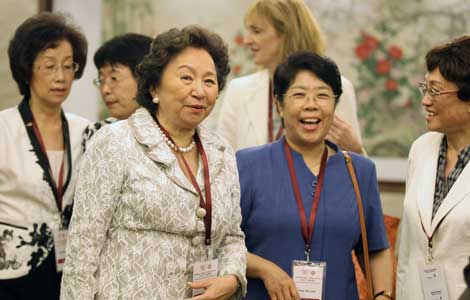Pleasing your loved ones is embedded in Chinese culture
Updated: 2013-08-13 07:25
By Nick Compton (China Daily)
|
||||||||

I remember the scene vividly:
Late last year, I was having lunch with a Chinese friend who was obviously upset. When I met her at the gate of the student canteen, she tried her best to make small talk, but something was clearly wrong. Her head hung low, her eyes were glued to the floor, and she spoke in one-breath answers, quiet and polite.
Finally, when we'd grabbed our trays and dug into the cafeteria food, she told me what was on her mind.
"My parents don't agree with my boyfriend," she said, elaborating that the couple had been dating for four years, and she could sense he was on the verge of marriage proposal. She loved him, she said, and she was sure he loved her.
But her parents, working-class people from central China, were practical to the bone. They didn't like the fact that he was a librarian in Beijing, or the fact that he was a few years shy of 30 and didn't own a car or an apartment. They asked my friend how he could possibly support her, and what use it would do to start a family with a man who could barely afford to feed himself, let alone a second (and potentially third) mouth.
My friend's arguments did not help. Her parents disagreed. That was final.
A few weeks after our meeting, just before the Chinese New Year and a family reunion that would have been painful had she disobeyed her parents, she broke up with him. There was no other way, she told me.
Such is the dilemma in modern China, where young adults must balance cultural and family expectations with the overpowering desire to blaze their own path and do things their own way - touting individualism over collectivism.
I've found that the expectations are fairly clear cut, and the roles are sometimes typecast from a Hollywood movie. Men are usually expected to secure a steady job and then lean on their families to buy a car, an apartment, and anything else that proves handy in landing a wife and starting a family. Women, for their part, are expected to succumb to their gender roles: Marry before 30, have a child, and raise him/her (preferably a boy) to success. In many circumstances, it seems like desperation kicks in if a woman is approaching 30 and hasn't married yet.
The toll these expectations take on many of my classmates from Tsinghua University's graduate school is obvious. As they approach graduation and prepare to enter the struggle of China's vicious job market, the expectations their family, teachers, and friends place on them is near crushing.
What this leads to, in many instances, is graduates accepting jobs they despise, or aren't good at, and entering living situations they abhor, because it's stable and, above all, what is expected of them.
To an American coming from a culture that places so much value on individualism, on pushing hard to achieve success for yourself above all others, sacrificing so much to make others happy is a hard cultural norm to swallow, but one that I've come to understand as an essential and inseparable chunk of Chinese culture.
Now, to my Chinese friends in situations that require delicate choices, I've learned not only to ask "What do you want?", but a lot of times, more importantly, "What do your loved ones want?"
Contact the writer at sundayed@chinadaily.com.cn.
(China Daily USA 08/13/2013 page8)
Most Viewed
Editor's Picks

|

|

|

|

|

|
Today's Top News
Academy will turn a Hilton into a dorm for Chinese
Brazil puts off bidding on bullet train
US to examine intelligence collection methods
Economists cautious about China's recovery
Consumers losing confidence in Fonterra
Surge in raw material imports 'positive'
Research funds spread across the globe
Reps gear up for TPP round 19
US Weekly

|

|













